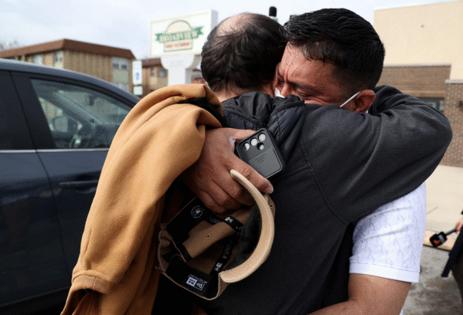Venezuelan migrant temporarily released from ICE to donate kidney to brother: 'He will get to save my life'
Published in News & Features
CHICAGO — A dying Venezuelan man was reunited with his brother Friday morning in an emotional reunion outside a restaurant near the ICE processing center in Broadview that federal authorities released him from so he could donate a kidney to save his brother’s life.
Alfredo Pacheco, 37, of Cicero, is facing terminal renal failure. On Wednesday, ICE agreed to release José Gregorio González, 43, to undergo the transplant, giving the siblings and those who support them much hope and relief.
“I’m extremely happy, it’s a blessing,” Pacheco told the Friday.
Last month, The Chicago Tribune was the first to report that González had been arrested by the Immigration and Customs authorities and was awaiting deportation. Elected officials, including Sen. Tammy Duckworth, Sen. Dick Durbin and U.S. Rep. Jesús “Chuy” García, rallied in support of the Venezuelan brothers, with more than 1,700 people signing a petition requesting that ICE release González.
Pacheco said he received a call from his brother a little after 9 a.m. Friday letting him know he’d been dropped off. Pacheco rushed to meet him, where he was waiting on the side of a road wearing a brown hat and a light sweater.
When they saw each other, they embraced and Pacheco kissed his brother’s cheek and caressed his face. It had been a monthlong fight to get him released.
According to authorities, González will be released for a one-year stay of removal under check-ins with immigration officials. He will be eligible for employment authorization. As early as next week, the brothers will begin the process of the kidney transplant.
“Outcomes like this are not common,” said the brothers’ attorney, Peter Meinecke, of The Resurrection Project.
At a news conference at the Pilsen Law Center later in the day, Pacheco thanked the The Resurrection Project, a nonprofit advocacy group representing the case, and the community for support.
“I thought I was alone in this, but I realized that is not true,” he said.
Garcia said the brothers’ case gives the immigrant community and elected officials motivation to continue advocating for immigrant rights.
“Today we say this is family, this is a happy reunion and we hope to have many of these in the future,” Garcia said.
State Rep. Elizabeth ‘Lisa’ Hernandez, a Democrat, said it highlighted the power of community organizations.
“We know that our immigration system is broken, and there are actors in this administration who would rather break it further than create meaningful solutions,” she said. “However, these obstacles should not obscure that everyday organizing and communities banding together to protect their neighbors should not be underestimated.”
In a statement, Duckworth said she felt “relieved” that Gonzalez was released.
“I will continue working hand-in-hand with local leaders, advocates, and elected officials to push back against Trump’s out-of-touch agenda and protect our immigrant communities,” Duckworth said.
Pacheco was diagnosed with end-stage renal disease not long after arriving in Chicago seeking asylum in July 2022. He said he fled from violence and political turmoil since he was a part of the armed forces in Venezuela. He wanted to find a job here and eventually bring his wife and children, a girl, 17, and twin boys, 9.
González, who also had come north searching for work and a better future, had been denied entry after he failed the credible fear screening at the southern border in late 2023. But once he learned his brother was diagnosed with end-stage renal failure, he tried again under the CBP One app, which allowed migrants to make appointments to enter the country.
It was then that González was put in removal proceedings and detained for a few months, but since there were no deportation flights to Venezuela, he was released to join Pacheco in Chicago under immigration supervision in March 2024.
After a long, complicated process to get approved for the transplant under public insurance, the brothers had an appointment in a Chicago hospital in April to go forward with more tests for the organ transplant. But on March 3, González was arrested and awaited deportation at Clay County Detention Center in Indiana.
González said Friday to being released and reunited with his brother felt “unbelievable.”
“I never thought it would happen,” he said.
The first thing the brothers plan to do when they get home is call their mother in Venezuela, they said.
“He will get to save my life,” Pacheco said with tears in his eyes. González nodded behind him.
Pacheco is currently on the wait list to get a transplant at IU health, a spokesperson confirmed. Even if his brother is not compatible, his donation would get him to jump the line to get the kidney sooner than later.
For now, Pacheco will continue getting dialysis for three days a week, four hours a day.
©2025 Chicago Tribune. Visit chicagotribune.com. Distributed by Tribune Content Agency, LLC.







Comments